16 Graduate Research Assistant Resume Examples
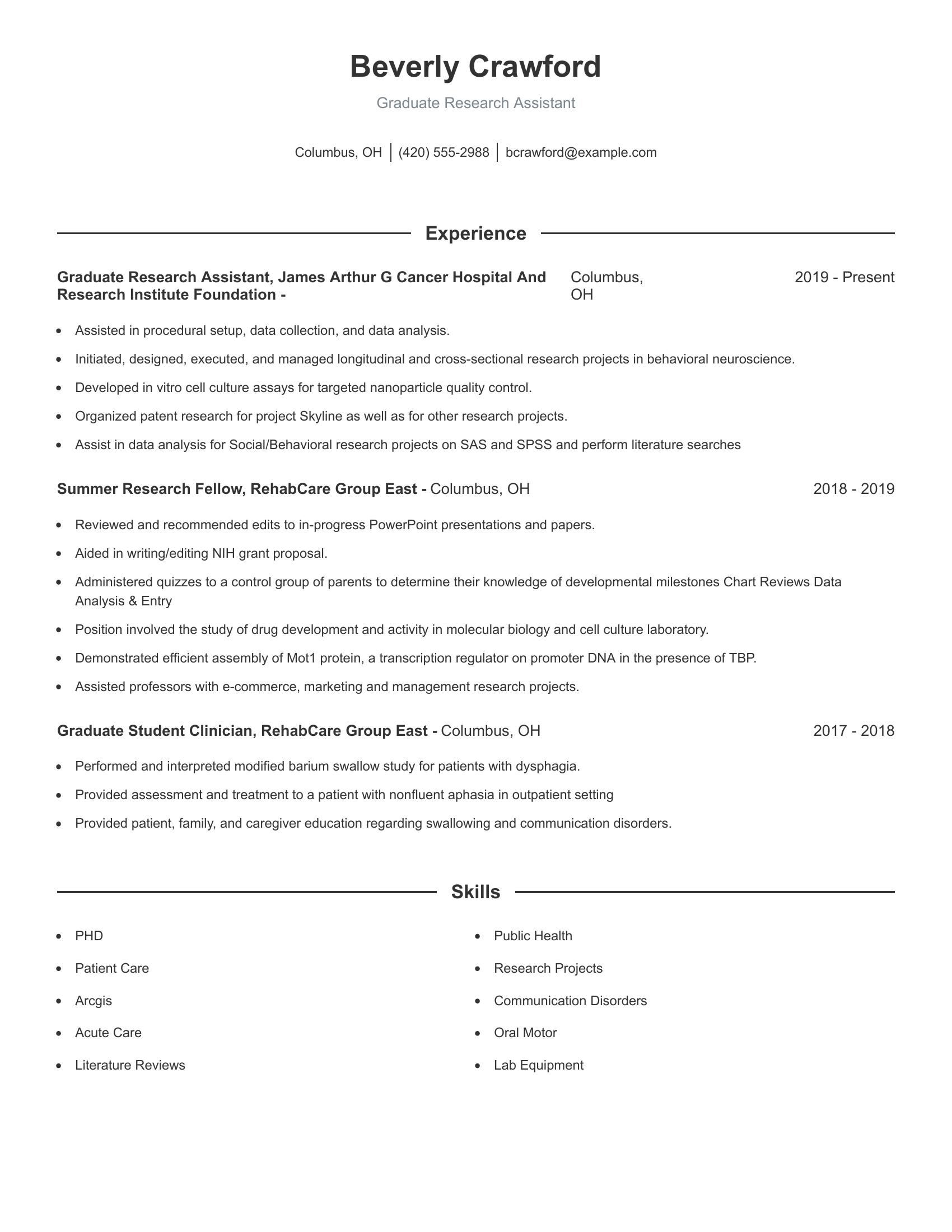



Graduate research assistant resumes should highlight relevant experience, academic achievements, and technical skills. Important components include a clear job title, contact information, detailed work experience with specific responsibilities, and educational background. Skills pertinent to the role, such as data analysis, grant writing, and laboratory techniques, should also be included.
This resume covers all necessary elements. It lists the job title and contact details at the top. The work experience section details specific tasks like data collection, research project management, and grant proposal writing. The education section shows relevant academic qualifications. Additionally, the resume highlights skills in data analysis software and laboratory procedures.

Graduate research associate resumes should highlight research experience, technical skills, and academic achievements. They should include details about specific projects, methodologies used, and any supervisory roles. Technical expertise and relevant work experience should be clearly listed to show the candidate's qualifications and readiness for research roles. Educational background with degrees and institutions attended is also important.
This resume includes detailed descriptions of past research projects, such as systematic literature reviews and gene modification techniques. It mentions supervisory roles over undergraduate assistants and lists specific technical skills like DNA analysis and cellular transfection. The work experience section shows a progression in roles from research technician to summer analyst, highlighting diverse skills. The educational section clearly states the degree earned and the institution attended.
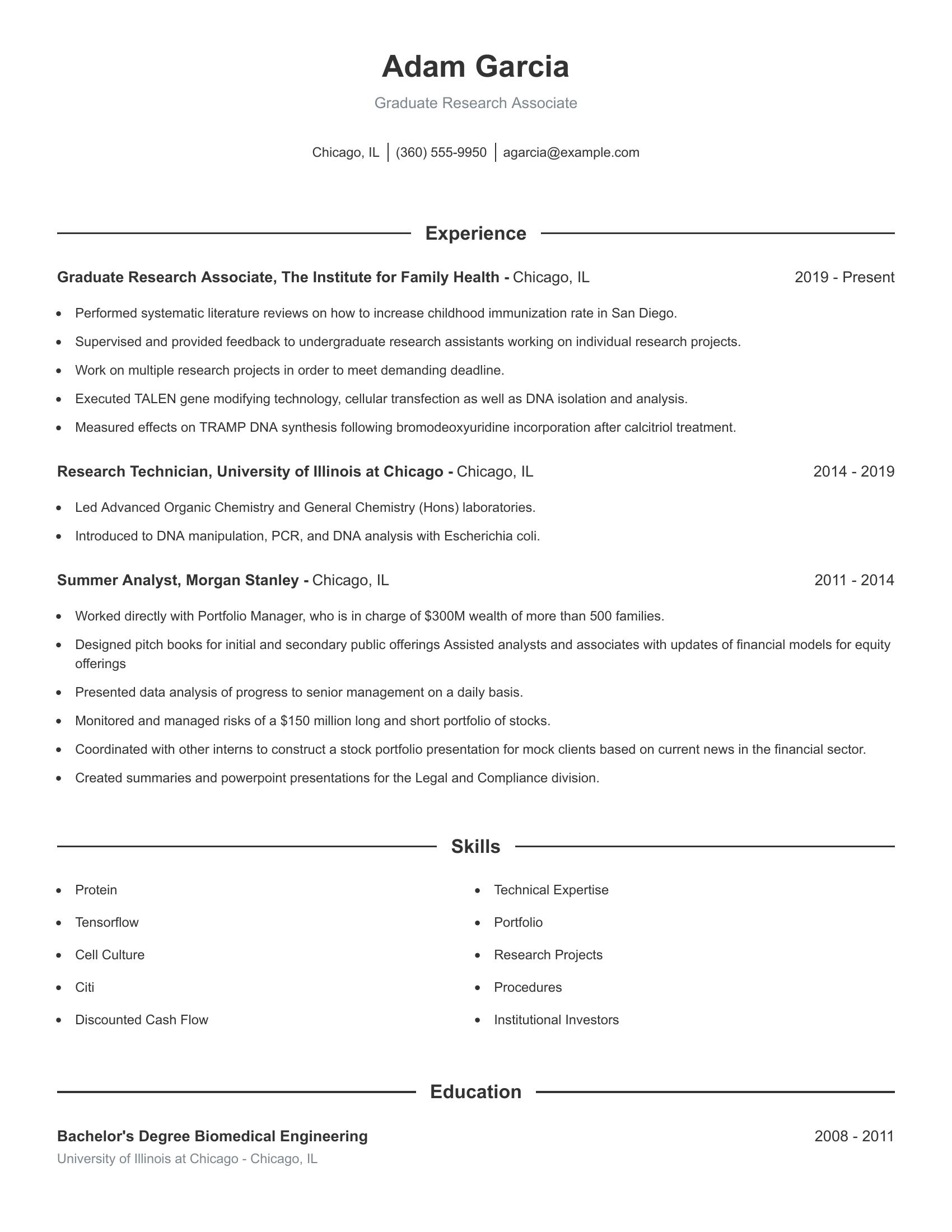
Research assistant resumes should highlight relevant skills, employment history, and education. Important skills include technical laboratory abilities, data analysis, and communication. Employment history should show prior research roles, detailing specific tasks and contributions. Education should be clearly listed, especially degrees related to the research field. Prior experience in similar roles is crucial to demonstrate hands-on expertise.
This resume includes relevant skills like DNA analysis, chromatography, and CAD. Employment history details roles at reputable institutions with specific duties such as evaluating DNA fragments and developing nanoparticles. The education section lists a bachelor's degree from a recognized university. This concise experience shows the candidate's qualifications for a research assistant role.
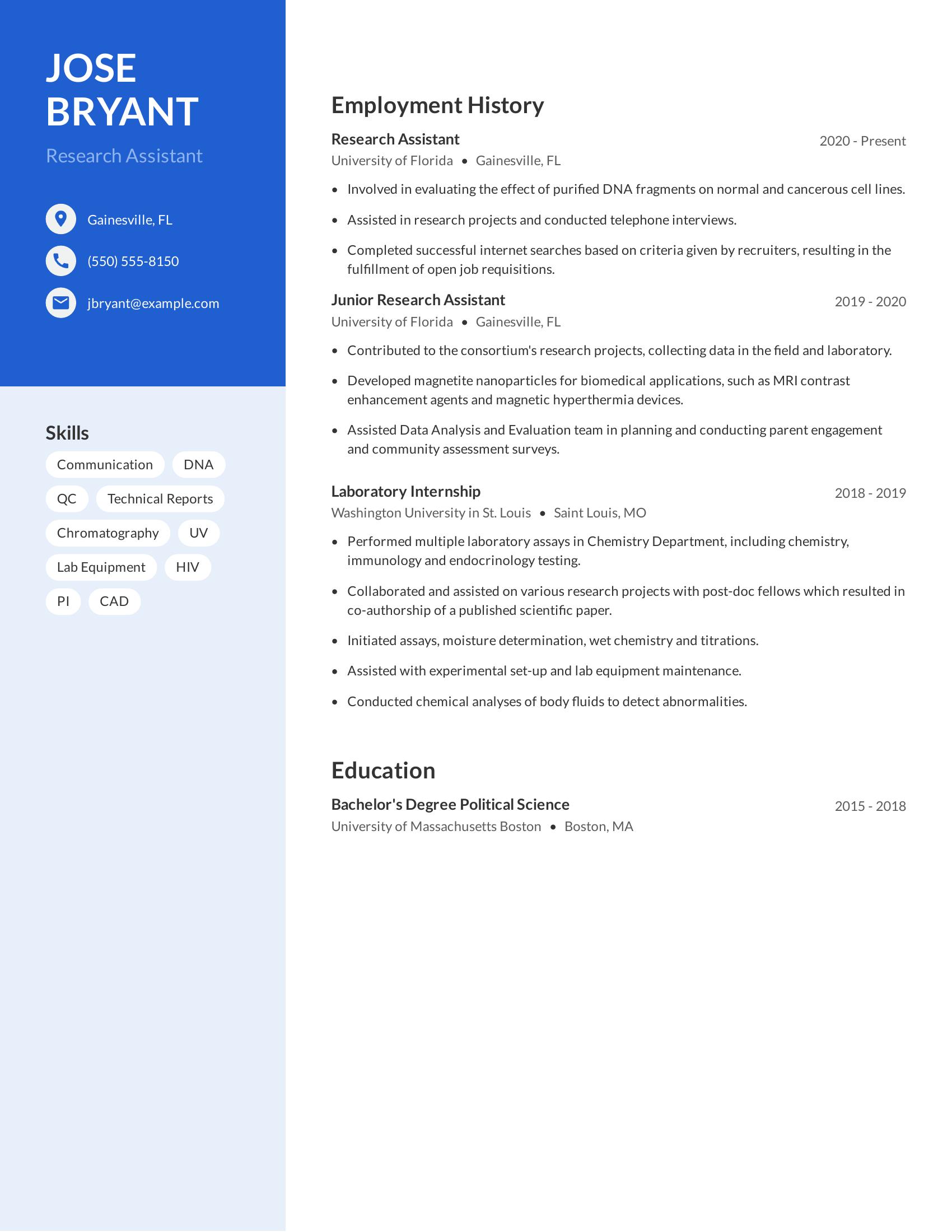
Graduate researcher resumes should highlight academic achievements, research experience, and relevant collaborations. They often include publications, technical skills, and any teaching or mentoring roles. Clear, concise descriptions of research projects and outcomes are important. The resume should also detail any professional development activities and community service, showing well-rounded capabilities.
This resume includes many of these specifics. It lists publications like a book chapter and journal articles. It describes technical skills such as LC/MS, GC, and NMR characterization. It mentions collaboration with a catalysis group and independent research in food microbiology. It also notes professional development workshops and community service activities, highlighting a broad skill set.
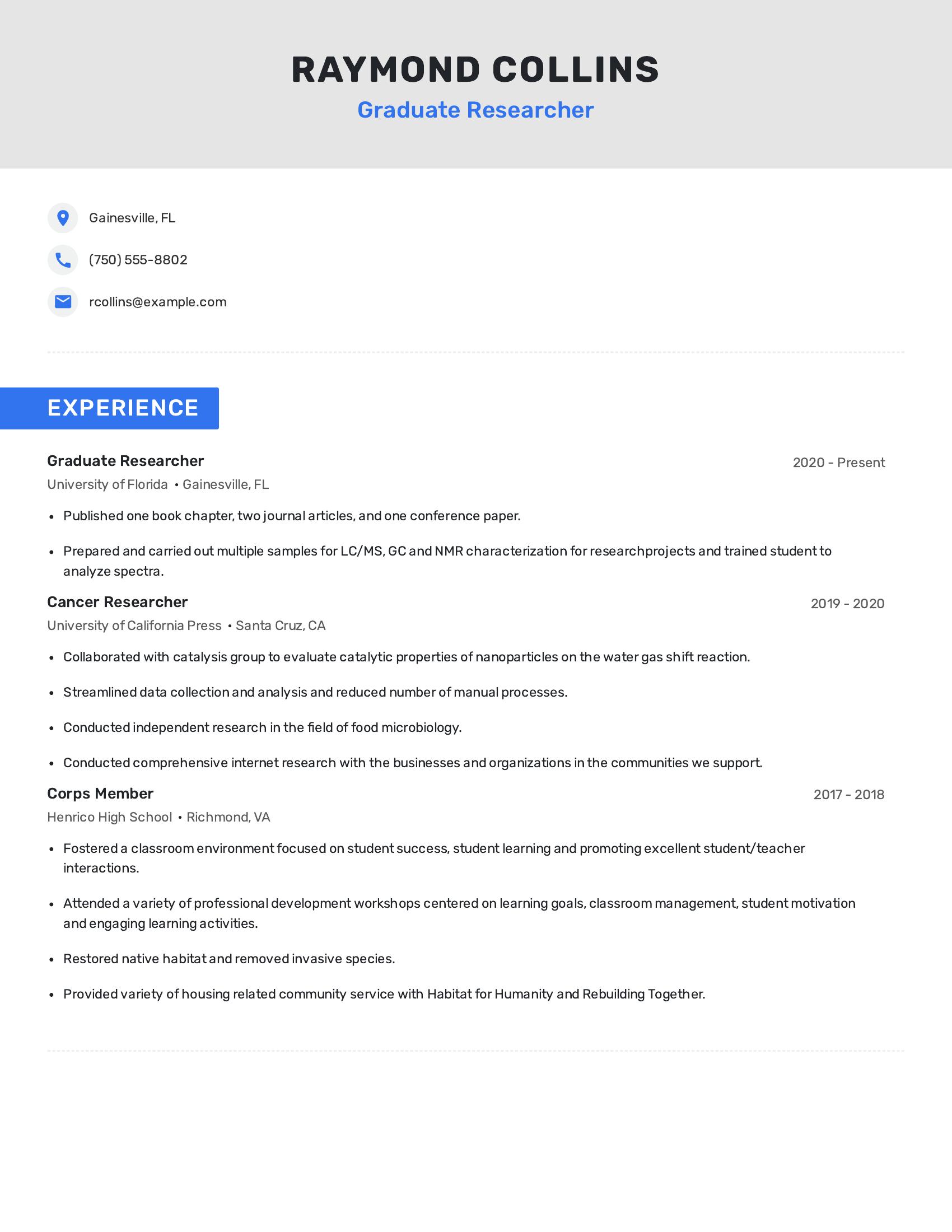
Research internship resumes should highlight relevant academic and professional experiences. They should include sections like contact information, work experience, skills, and education. Details about research projects, hands-on lab work, and familiarity with industry standards are important. Mentioning specific tasks and technologies used shows practical knowledge. Clear and concise descriptions of responsibilities and achievements are crucial.
This resume includes specifics like data extraction, data cleaning, and data analysis tasks. It mentions experience with ISO 9001 quality management systems and Six Sigma. It lists various roles and projects related to research, indicating a strong background in the field. The inclusion of technical skills like scripting in C# and communication protocols further strengthens the resume.
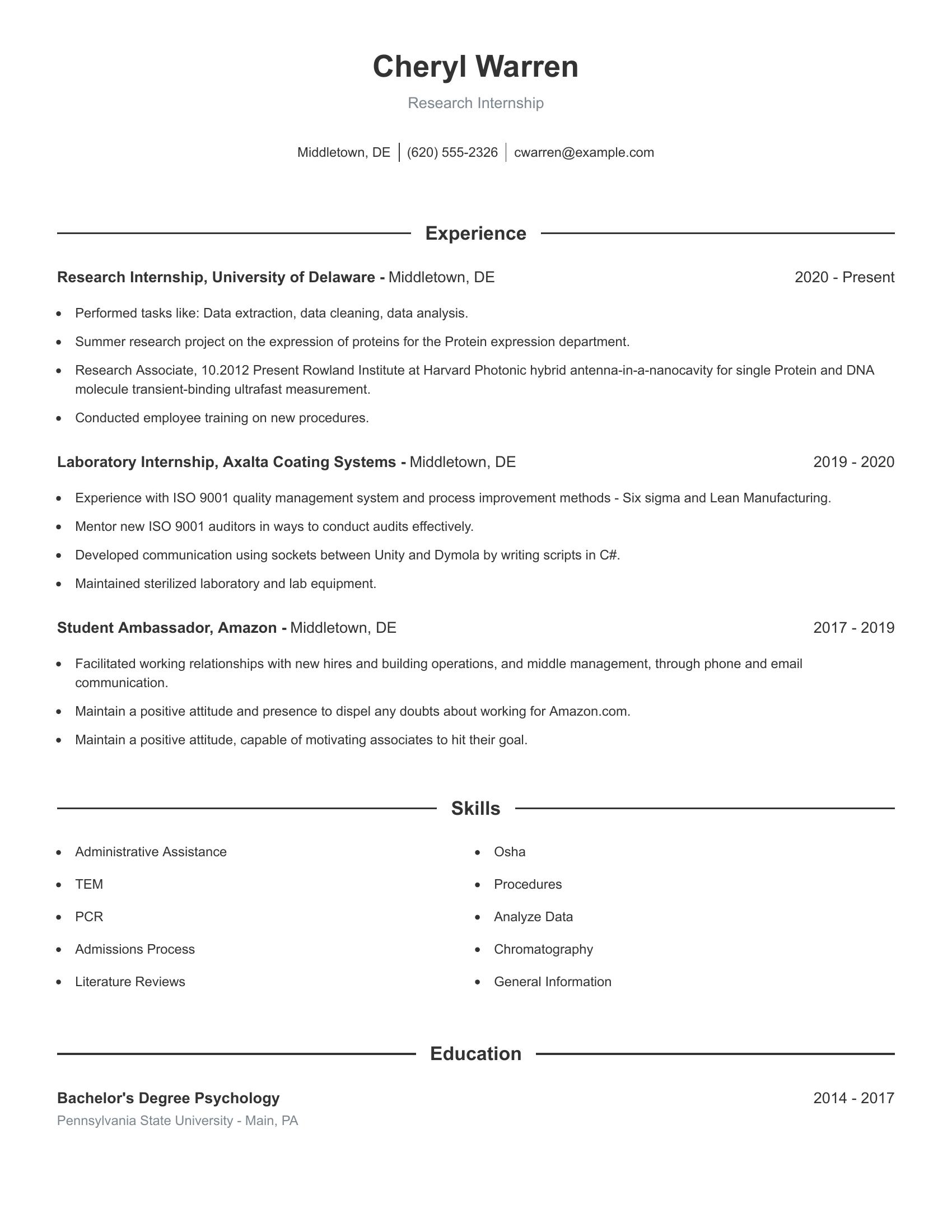
Graduate research student resumes should highlight relevant research experience, education, technical skills, and any significant contributions to their field. It is important to include detailed descriptions of research projects, methodologies used, and any resulting publications or presentations. Additionally, listing relevant internships or assistantships that provide practical experience can bolster the resume. Key technical skills and proficiencies with specific software or lab techniques should also be included.
This resume includes a detailed employment history with specific roles and responsibilities that showcase the student's research experience and technical skills. The projects mentioned demonstrate the application of various research methodologies and the use of specific software tools. The education section clearly lists advanced degrees related to the field, and the skills section succinctly highlights technical proficiencies. This combination of detailed project descriptions, relevant experience, and technical skills makes it a good example of what constitutes an effective graduate research student resume.
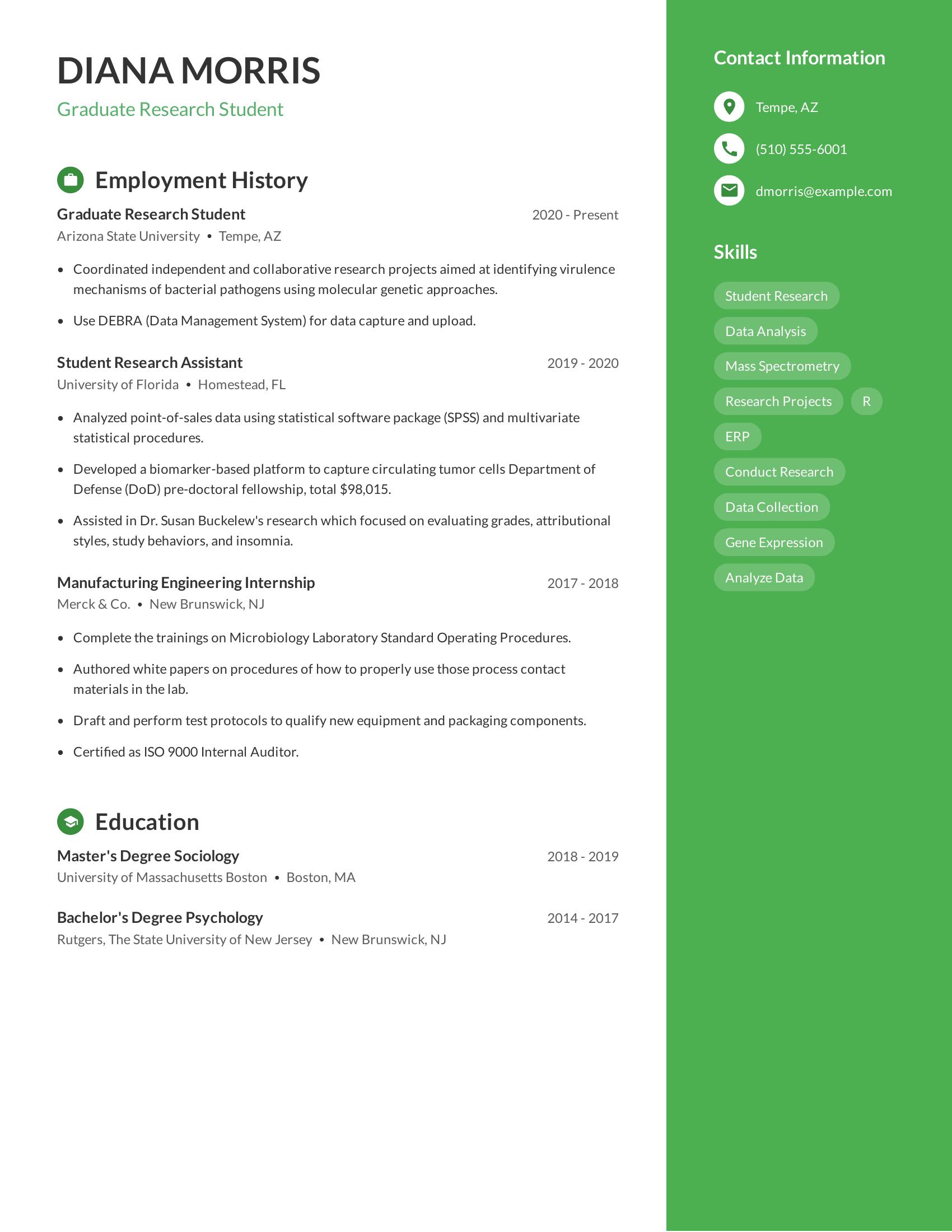
A research trainee resume should highlight relevant academic background, practical experience, and specific skills. It includes educational qualifications, research internships, and any hands-on projects or publications. The resume should demonstrate the candidate's ability to perform research tasks like data analysis, developing methodologies, and using specialized software. Clear and concise bullet points detailing responsibilities and achievements make the resume effective.
This resume includes a bachelor's degree in biomedical engineering, which is pertinent for a research role. It lists relevant experiences such as internships where the candidate developed training videos, conducted data analysis, and improved analytical methods. The mention of specific tasks like HPLC methods and software skills like Python adds value. It also shows involvement in significant projects and publications, which strengthens the application.
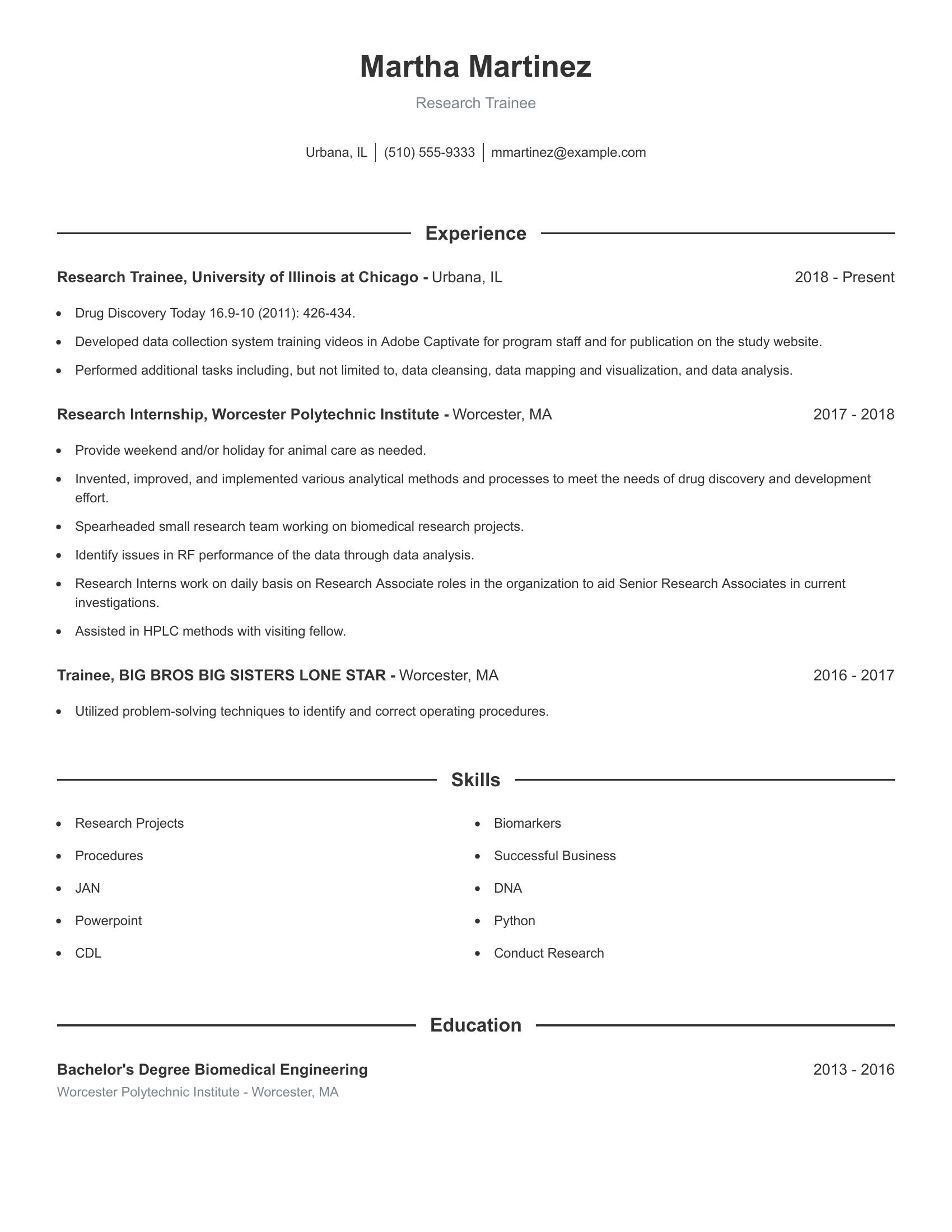
Assistant research scientist resumes should highlight relevant experience and skills in research methodologies, data analysis, and laboratory techniques. It should include a detailed work history with specific roles and responsibilities that demonstrate proficiency in managing research projects. Skills in data management, cell culture, and gene sequencing are also important. Educational background should be relevant to the field, typically including a degree in a related scientific discipline.
This resume includes diverse experience in both academia and the private sector. It details specific tasks like data entry for participant recruitment, maintaining cell cultures, and managing research projects under strict guidelines. The candidate's skills in data collection and clinical trials are evident, along with technical expertise in gene sequencing and financial modeling. The educational background supports the role with a bachelor's degree in biology.
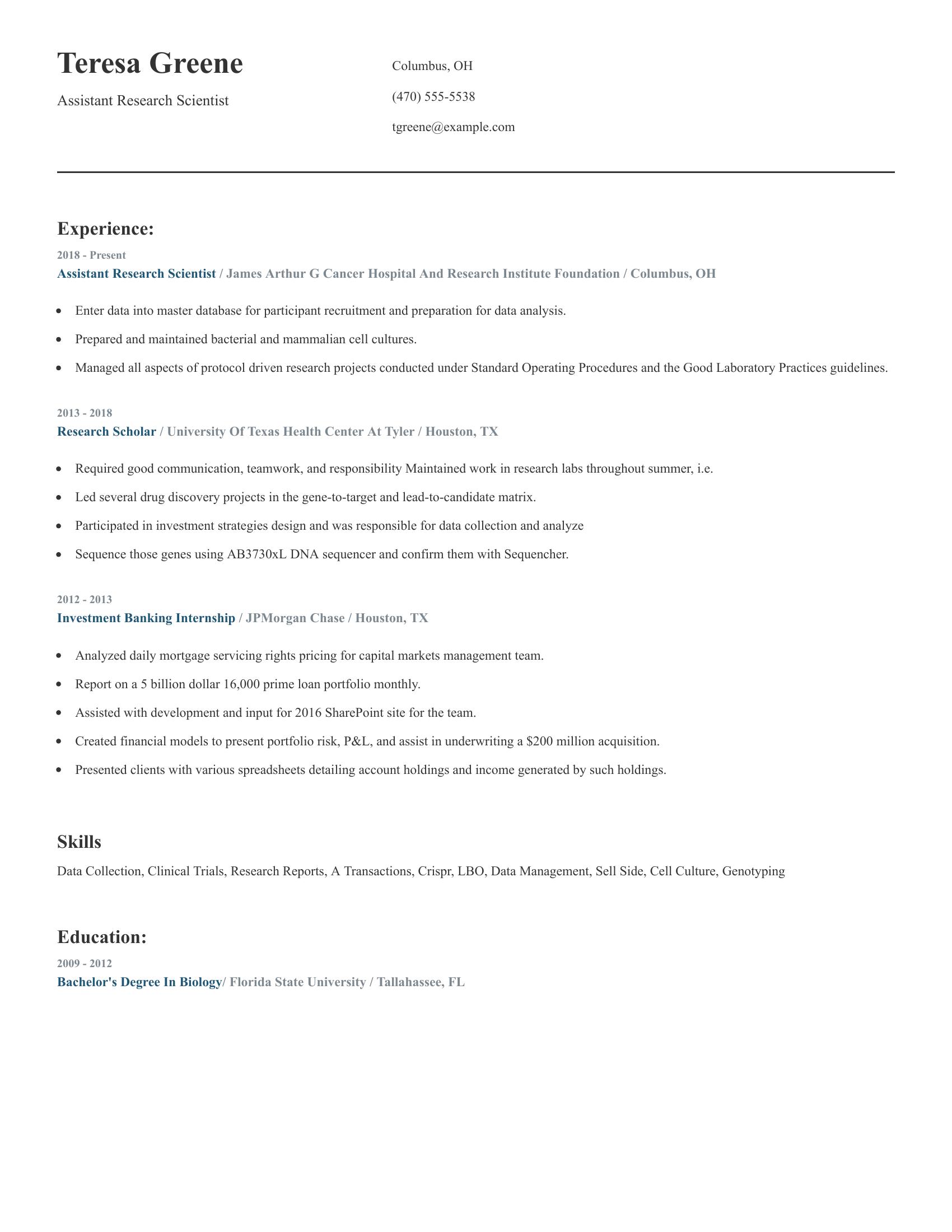
Doctoral research assistant resumes should highlight relevant experience, technical skills, and education. It should include job titles, organizations, dates of employment, and responsibilities. Emphasize specific tasks that showcase expertise in research methodologies, data analysis, and lab management. Skills should be directly related to the research field. Educational background with degrees and majors must be clearly stated.
This resume includes detailed job experiences such as training lab personnel, building regression models, performing imaging and supporting students. Skills listed are pertinent to research like DNA analysis and clinical trials. The educational section is clear with degree titles, institutions, locations, and majors. This structure helps convey relevant professional history and academic background efficiently.
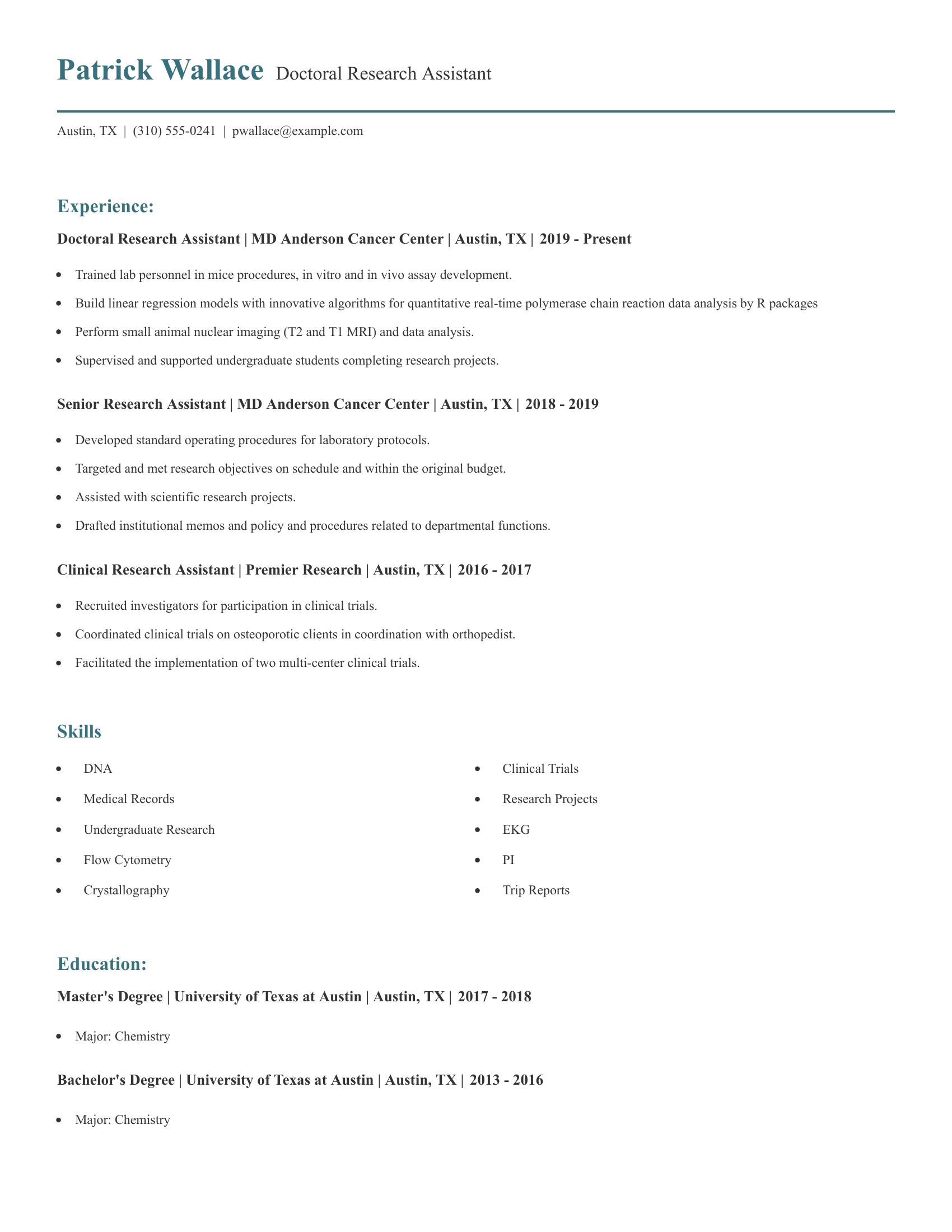
Student research assistant resumes should highlight relevant academic and research experience, technical skills, and any significant contributions to projects. It should include job titles, employment dates, and specific tasks or achievements. Relevant internships, part-time jobs, and notable coursework or lab work should also be mentioned. The resume should emphasize proficiency in research methodologies, data analysis, and any specialized techniques or software used.
This resume includes specific roles such as conducting employee training, identifying research opportunities, and maintaining cell cultures. It mentions technical skills like peptide synthesis and data analysis. The inclusion of a research internship and part-time job shows a range of experience. This resume effectively lists skills relevant to research, such as PowerPoint and poster presentation preparation.
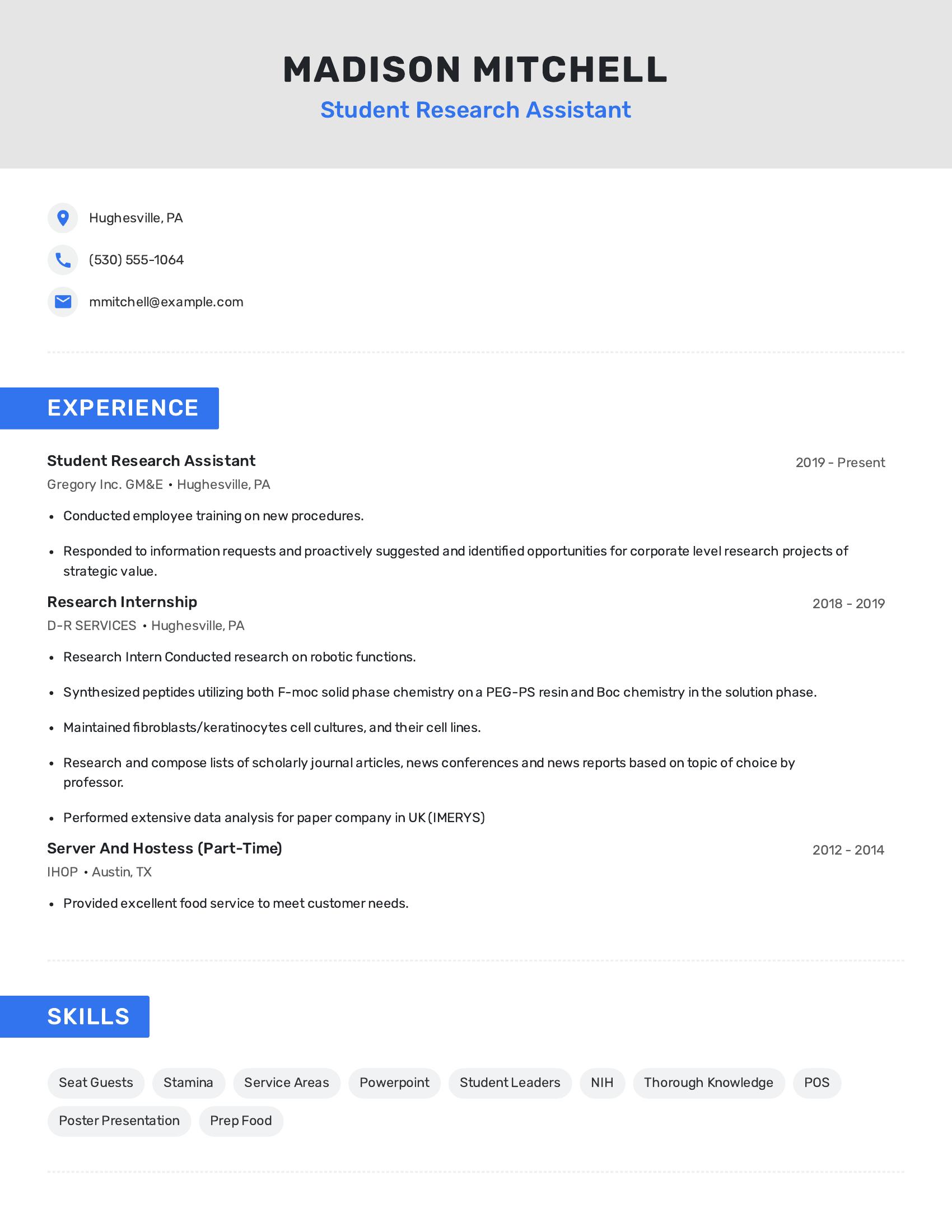
Research fellow resumes should highlight relevant research experience, technical skills, and academic achievements. A strong resume includes a detailed work history with specific roles and responsibilities, a list of technical proficiencies, and educational background. It should also showcase contributions to significant projects, publications, and any mentoring or leadership roles.
This resume includes comprehensive work experience in research settings, detailing specific tasks like conducting preclinical studies and evaluating new techniques. It lists technical skills such as using HPLC, GC-MS, and NMR for compound analysis. The educational background is clearly stated, and the resume features roles that demonstrate leadership and training of junior analysts. Additionally, it mentions significant projects and presentations at professional conferences.
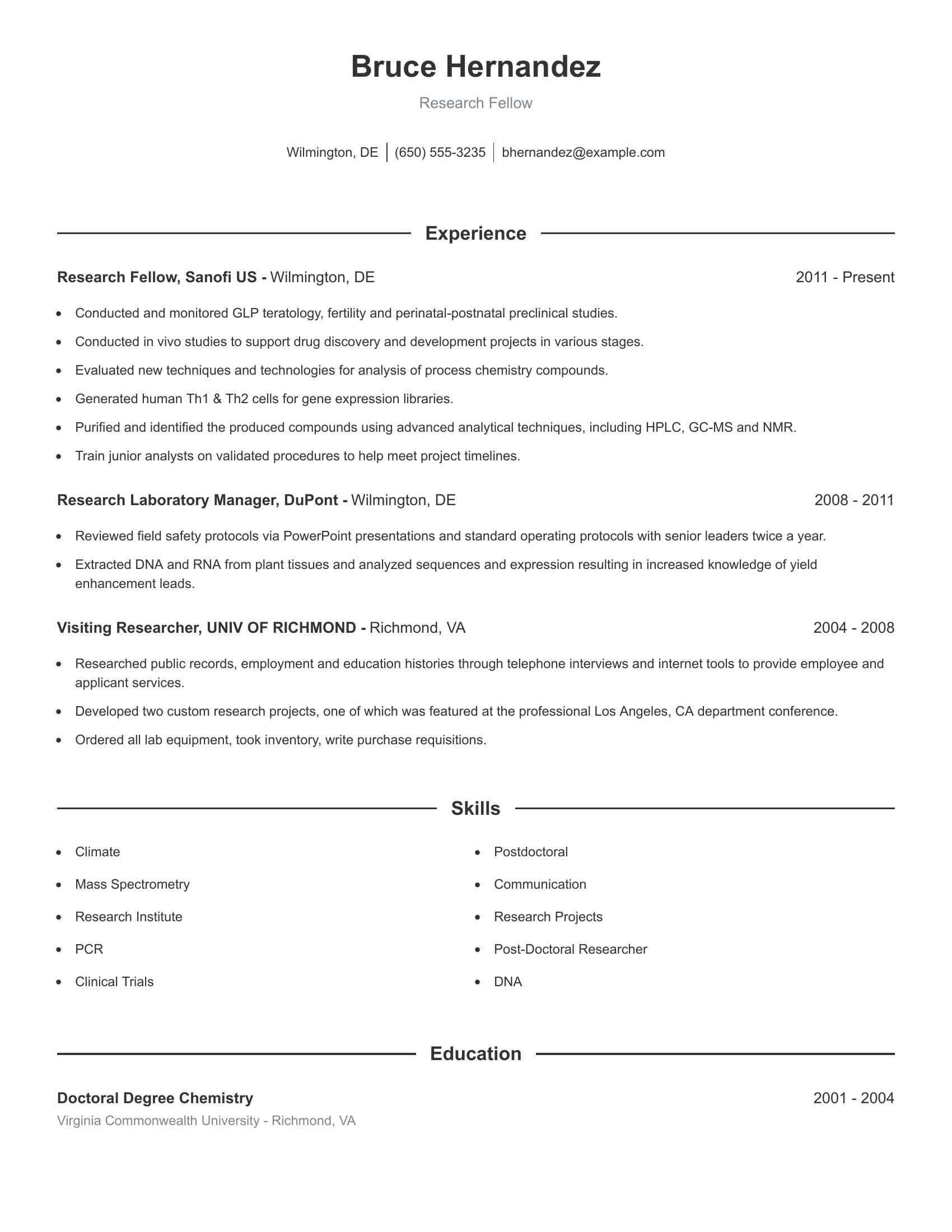
Laboratory research assistant resumes should highlight relevant skills, job experiences, and educational background. Key elements include hands-on experience with lab equipment, data analysis, and molecular biology techniques. Clear descriptions of past research projects and roles help showcase the candidate's expertise and practical knowledge. Education should be listed prominently, especially advanced degrees related to the field.
This resume includes those specifics well. It lists relevant skills like molecular biology, gene expression, and lab equipment usage. The candidate has detailed employment history showing their progression in research roles. The education section is clear and relevant, listing both bachelor's and master's degrees in psychology. Detailed descriptions of past projects and research activities further demonstrate the candidate's experience and technical abilities.
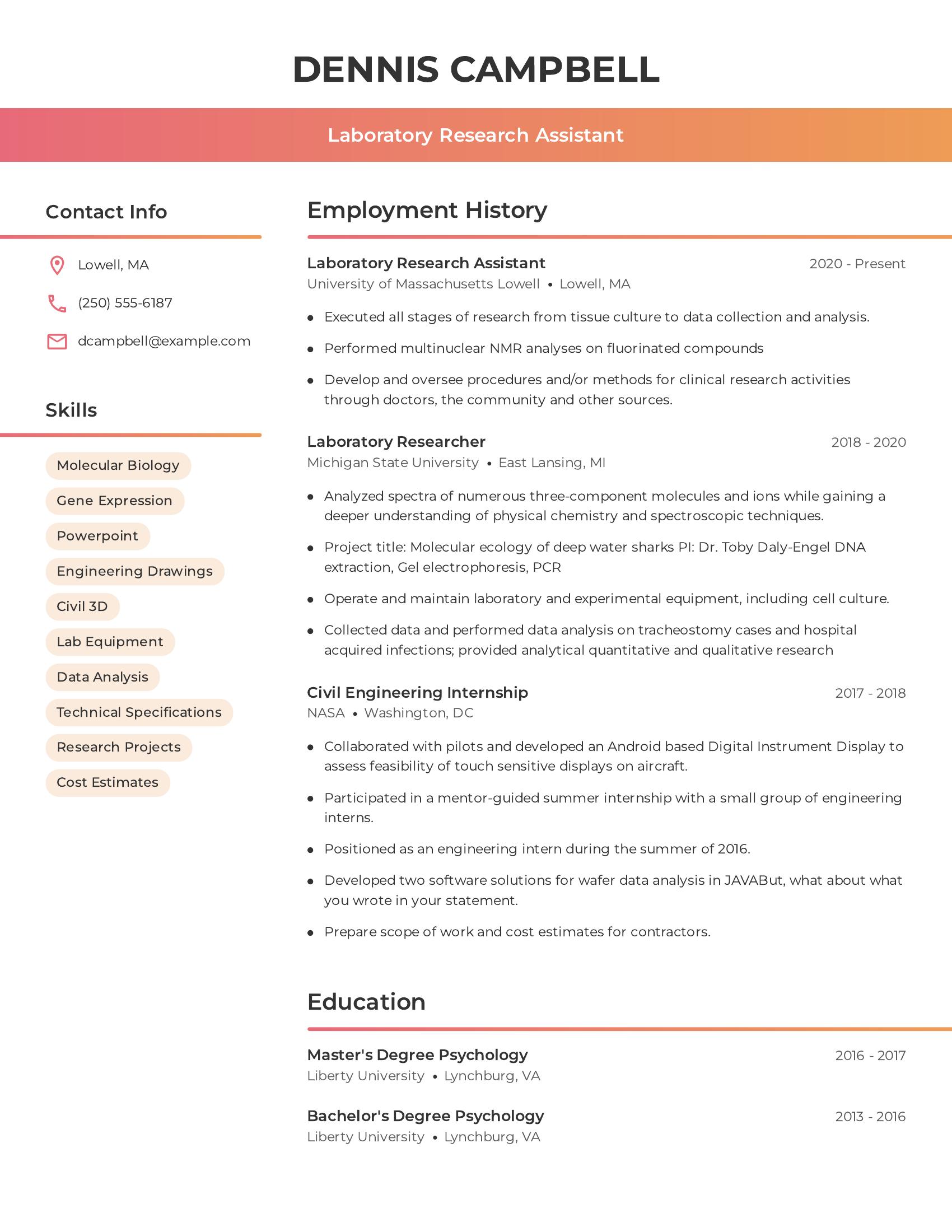
Graduate research and teaching assistant resumes should include specific experiences and skills demonstrating research abilities, teaching experience, and relevant technical expertise. Key components are clear employment history with detailed responsibilities, educational background that shows relevant degrees, and a skills section highlighting technical proficiencies. It's important to list specific tasks performed, such as conducting laboratory sessions, managing data, and assisting in teaching various subjects.
This resume includes detailed employment history with roles as a graduate research and teaching assistant at two different universities. It lists specific tasks like conducting classroom laboratory sessions, assisting professors, and teaching multiple subjects. The resume also highlights the candidate's experience in data management and operating laboratory equipment. Additionally, it includes relevant educational qualifications and a comprehensive skills section that covers various proficiencies related to both research and teaching.
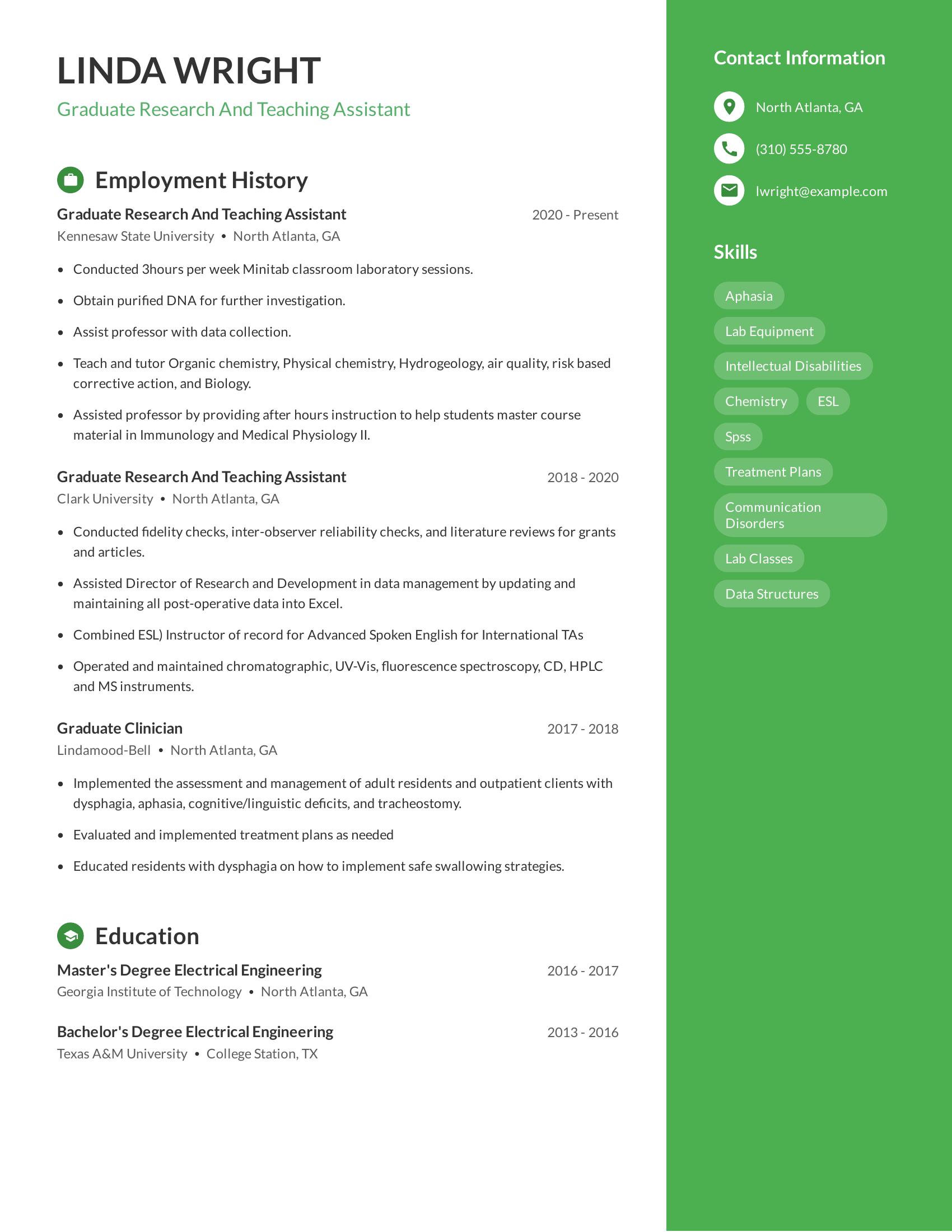
Postdoctoral research scientist resumes should include clear details about their employment history, highlighting specific research experiences, techniques used, and contributions to scientific projects. Education credentials should be listed, showing progression from a bachelor's degree to a doctoral degree. Skills relevant to the field, such as data analysis and laboratory techniques, are also important.
This resume includes detailed employment history with specific tasks and research methods mentioned for each role. It lists educational qualifications in reverse chronological order, showing a clear academic progression. The skills section highlights relevant competencies like project management and cell culture, which are crucial for the role.
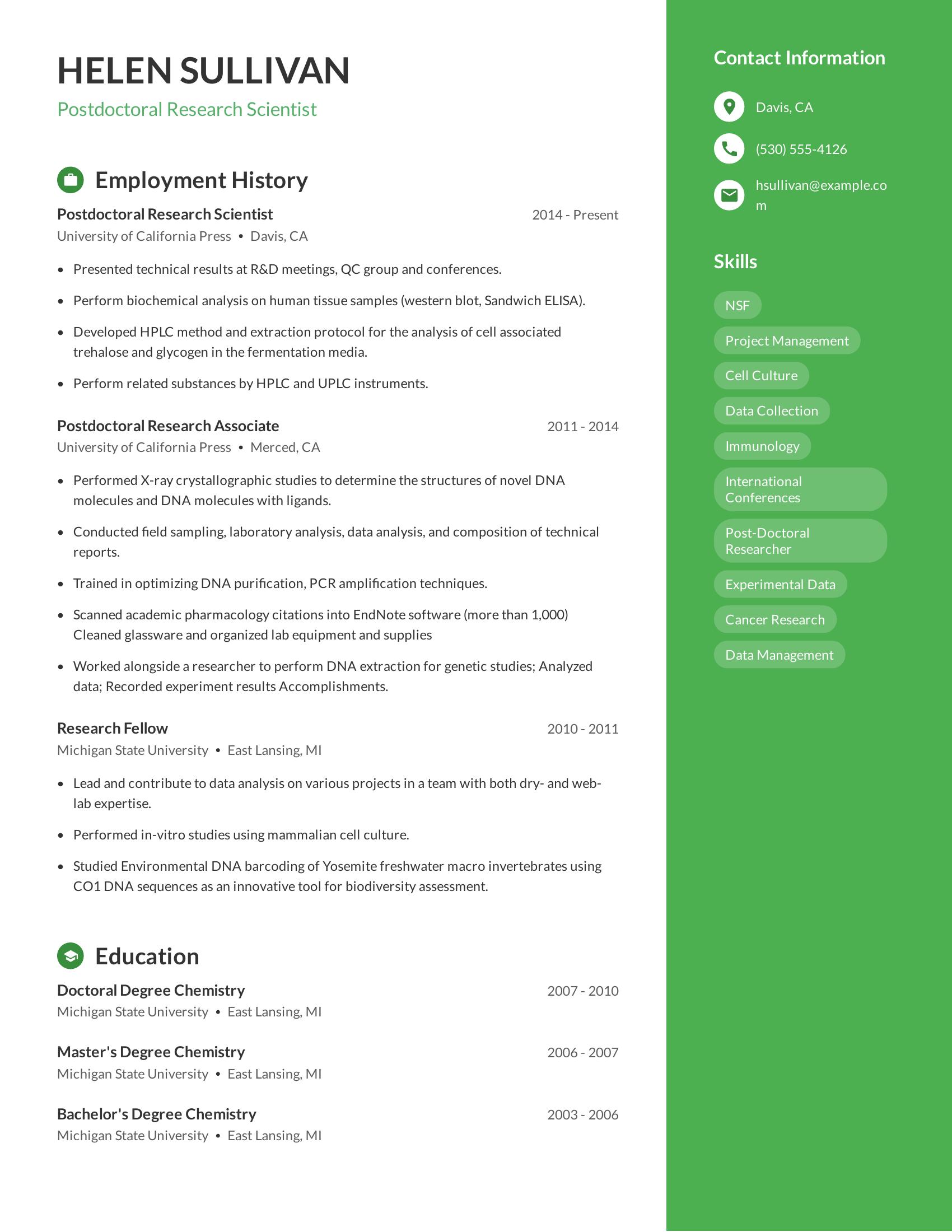
Graduate student assistant resumes should include clear sections on experience, skills, and education. They must highlight research abilities, technical skills, and relevant academic achievements. Responsibilities should be specific and show direct contributions to projects. Clarity and conciseness are critical.
This resume includes detailed work experience with specific tasks such as literature reviews, data analysis, and lab procedures. It lists relevant skills like data analysis and treatment plans. The education section clearly states degrees and institutions, making it easy to understand the candidate's background.
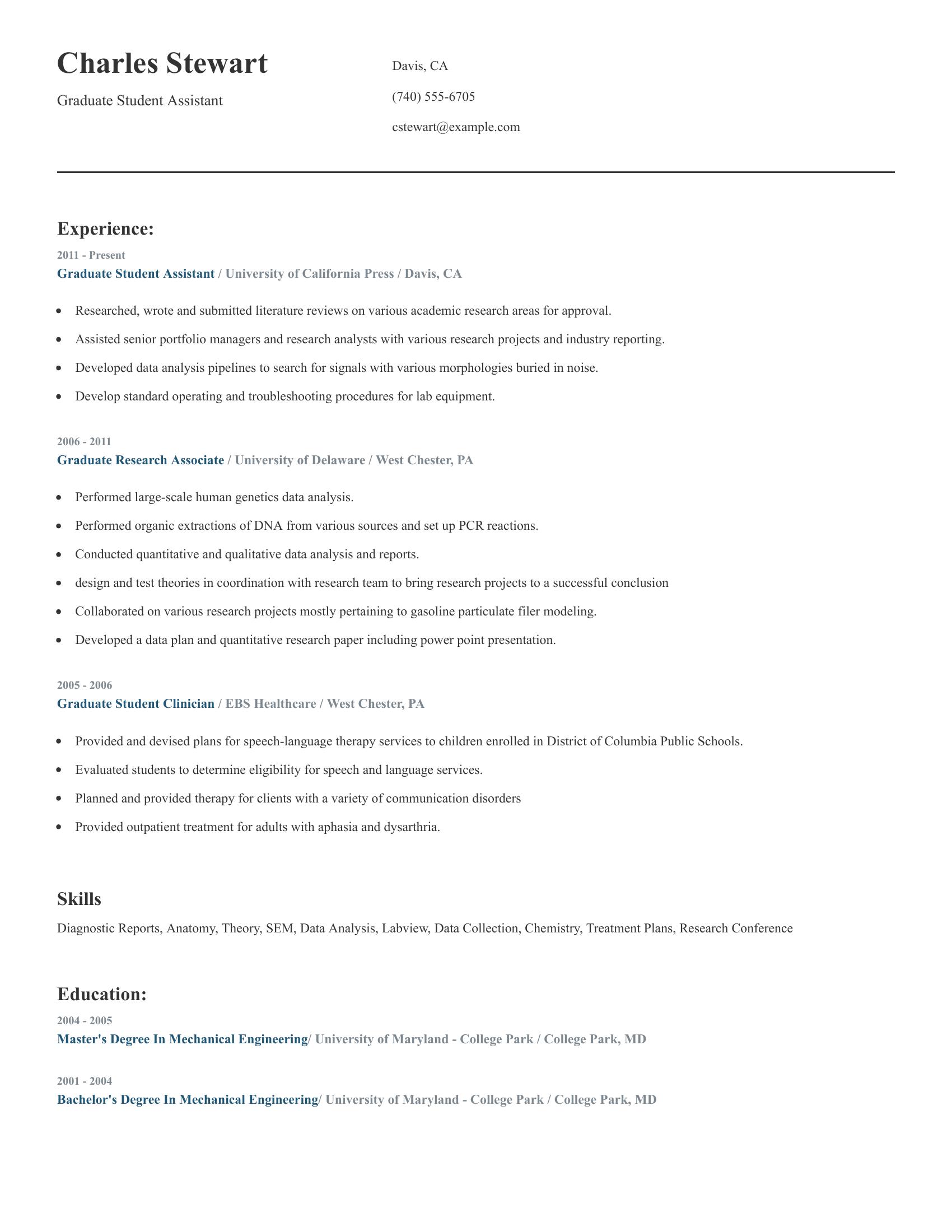
Junior research fellow resumes should highlight relevant skills, employment history, and specific accomplishments in research. Important sections include contact information, a list of technical skills, detailed job descriptions that showcase research experience, and any certifications. A clear focus on laboratory techniques, project management, and contributions to academic or industrial research is vital.
This resume effectively includes the specifics needed for a junior research fellow position. It lists contact information, relevant technical skills like cell culture and molecular biology, and a detailed employment history with substantial achievements. The resume also highlights experience with experimental procedures, software development for data analysis, and participation in academic conferences. Furthermore, it mentions certifications such as first aid/CPR and involvement in organizing daily activities in previous roles.
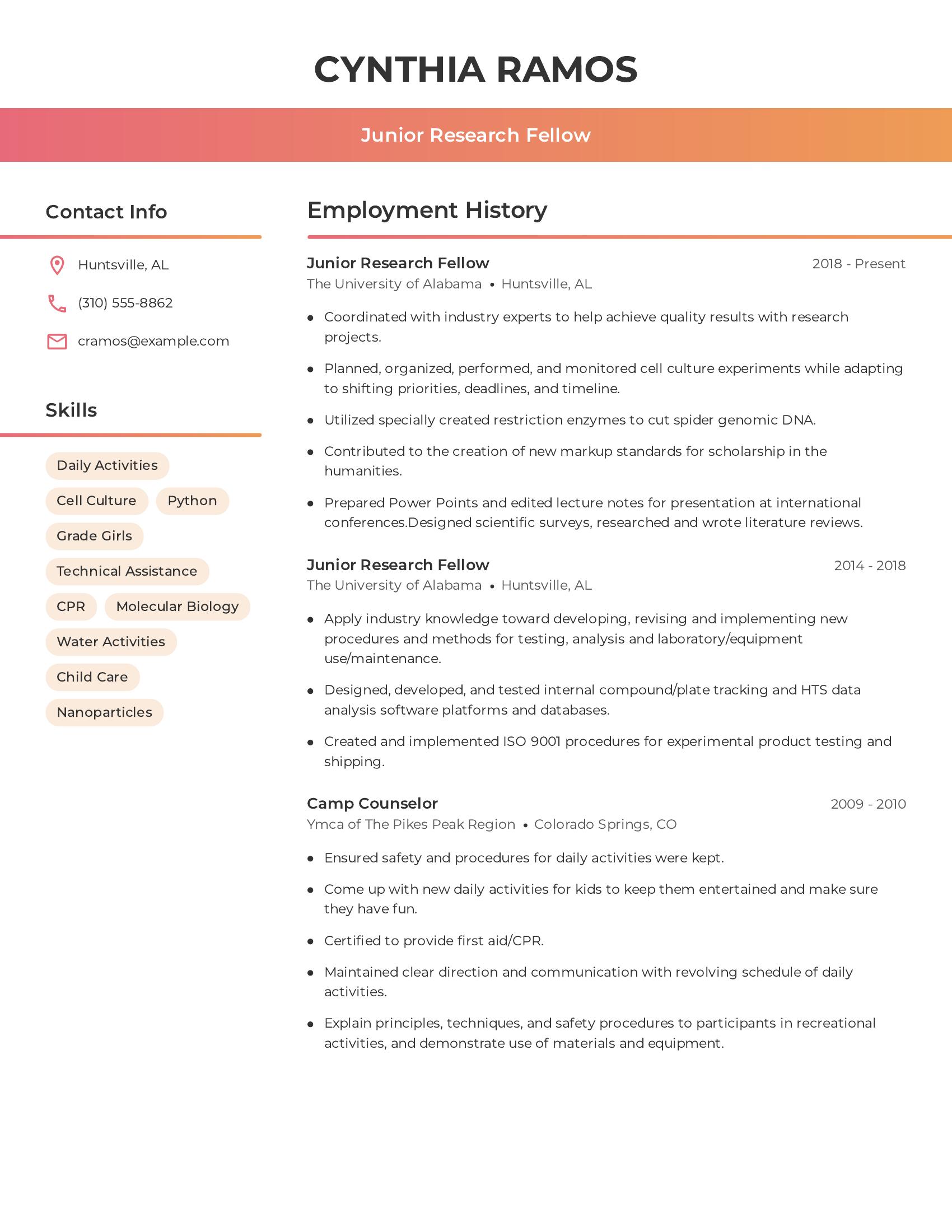
Postdoctoral research associate resumes should highlight experience in advanced scientific research, data analysis, and project management. Key elements include a strong educational background, technical skills in using specialized equipment, and experience with data interpretation. Effective communication skills, both written and verbal, are also important for presenting findings and collaborating with teams. A good resume should showcase specific achievements and contributions to research projects.
This resume includes relevant experience in various roles, demonstrating a strong background in scientific research and data management. It highlights proficiency with NMR Spectroscopy, DSC, GC-MS, and other technical skills. The candidate has experience in planning and executing large-scale projects and analyzing data using SPSS. The resume also shows versatility with roles in different industries, such as healthcare and environmental science.
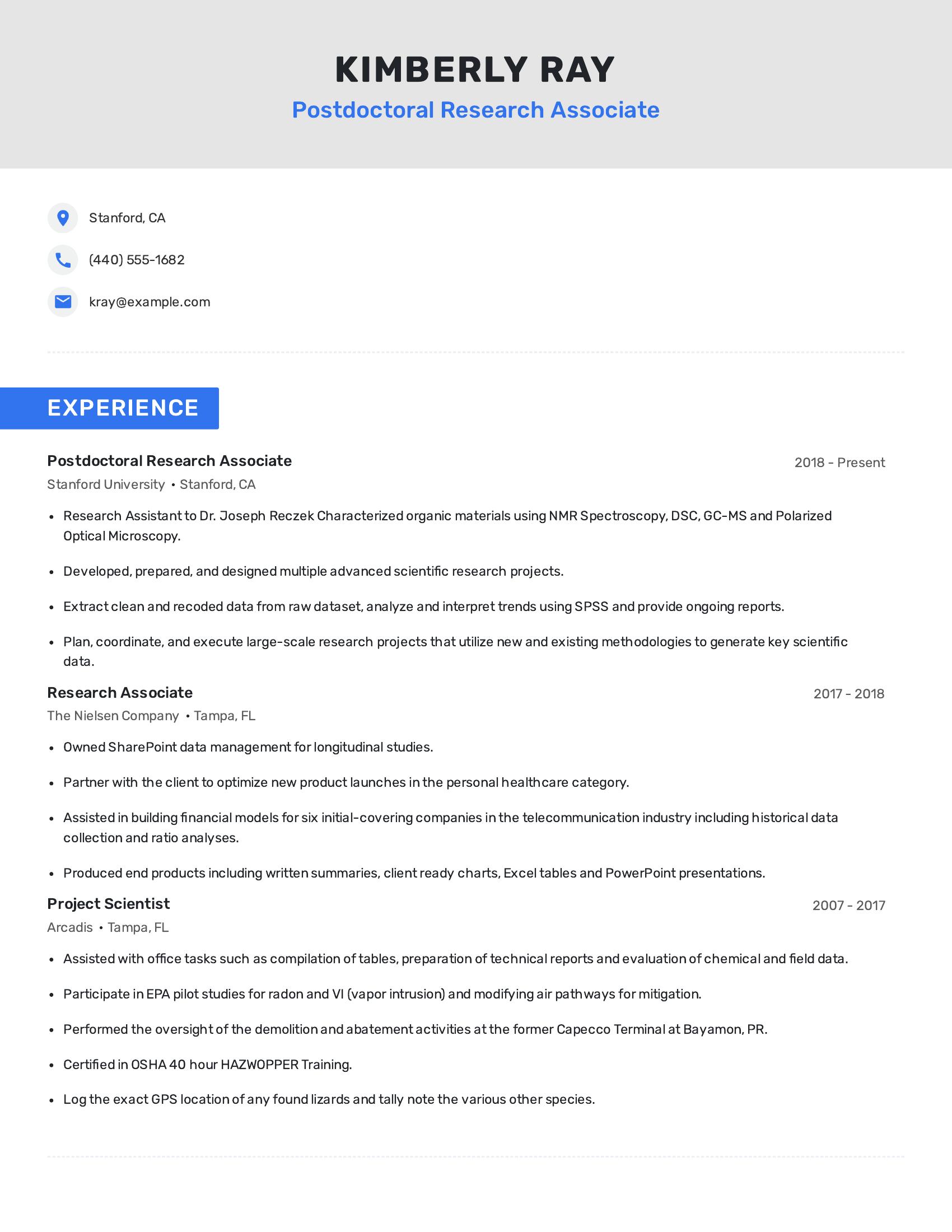
Highlight research experience. List specific projects and your role, such as data collection or analysis techniques used.
Detail technical skills. Mention software, lab equipment, or programming languages you used, like SPSS or R.
Show collaboration. Describe teamwork with professors or other students, including any co-authored publications or presentations.
A graduate research assistant's resume should focus on academic background, research experience, skills, and publications. Start with contact information and a brief objective. Include education details with degrees and institutions. Highlight research projects with specifics on your role and outcomes. List technical and soft skills relevant to research. Add any publications, presentations, or conferences attended.
A well-written graduate research assistant summary highlights relevant experience and skills. It should show your research background and abilities clearly.
Follow these tips to make your resume summary impactful and easy to read.
Writing a strong experience section for a graduate research assistant involves focusing on specific tasks and achievements.
Follow these tips to create an impactful resume section for a graduate research assistant role.
A graduate research assistant needs strong technical abilities to perform their tasks effectively.
A graduate research assistant also needs strong interpersonal skills to work well in a team and manage their workload.